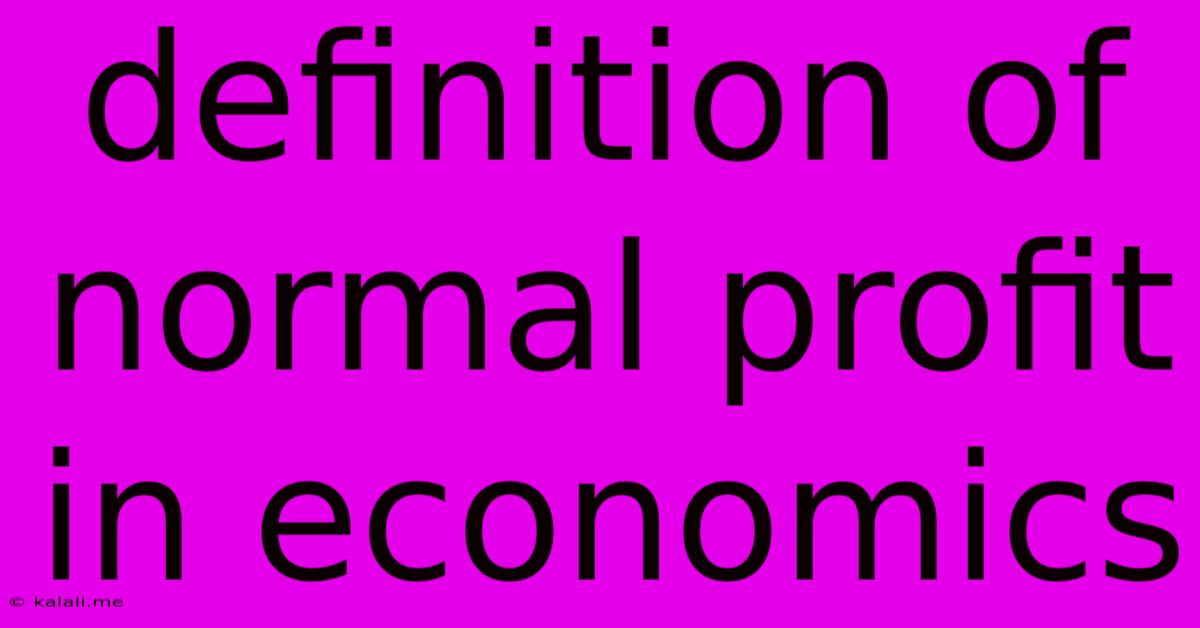Definition Of Normal Profit In Economics
Kalali
Jun 14, 2025 · 3 min read

Table of Contents
Defining Normal Profit in Economics: More Than Just Breaking Even
Understanding "normal profit" is crucial for grasping fundamental economic concepts like market structures and firm behavior. This article will delve into the definition of normal profit, distinguishing it from accounting profit and economic profit, and exploring its implications for businesses and the economy.
What is Normal Profit?
Normal profit represents the minimum level of profit necessary for a firm to remain in its current market. It's the return a firm must earn to cover all its explicit and implicit costs, including the opportunity cost of the resources used. In essence, it's the profit required to keep a business operating at its current scale and in its chosen industry. This means the firm is earning enough to justify staying in business rather than pursuing alternative opportunities. Thinking of it another way, it's the minimum profit needed to cover all costs and ensure the business isn't losing money. Failure to earn normal profits will eventually lead to the firm exiting the market.
The Difference Between Normal Profit, Accounting Profit, and Economic Profit:
It's vital to distinguish normal profit from other types of profit:
-
Accounting Profit: This is the difference between a firm's total revenue and its explicit costs. Explicit costs are direct, out-of-pocket payments, such as wages, rent, and materials. Accounting profit is readily available from a company's financial statements.
-
Economic Profit: This considers both explicit and implicit costs. Implicit costs represent the opportunity cost of using resources already owned by the firm, such as the owner's time and capital that could be invested elsewhere. Economic profit is what remains after both explicit and implicit costs are subtracted from total revenue.
-
Normal Profit: Normal profit is essentially zero economic profit. It represents the minimum return required to keep a firm in business, covering both explicit and implicit costs, including the opportunity cost of the resources.
Calculating Normal Profit:
Let's illustrate this with an example. Suppose a bakery has:
-
Total Revenue: $100,000
-
Explicit Costs (wages, rent, ingredients): $70,000
-
Implicit Costs (owner's salary forgone, forgone investment returns): $20,000
-
Accounting Profit: $100,000 - $70,000 = $30,000
-
Economic Profit: $100,000 - $70,000 - $20,000 = $10,000
-
Normal Profit: In this scenario, the bakery is earning an economic profit of $10,000, exceeding its normal profit (which would be $0 economic profit).
Implications of Normal Profit:
-
Market Equilibrium: In a perfectly competitive market, firms will earn only normal profits in the long run. If firms earn economic profits, new firms will enter the market, increasing supply and driving down prices until economic profits are eliminated. Conversely, losses will cause firms to exit the market.
-
Resource Allocation: Normal profit plays a significant role in directing resources to their most efficient uses. Industries with higher-than-normal profits attract investment and expansion, while industries earning below-normal profits experience contraction. This dynamic process ensures that resources are allocated to where they yield the highest returns.
-
Business Decisions: Understanding normal profit helps businesses make informed decisions regarding pricing, production, and market entry/exit strategies. A firm needs to ensure its revenue streams are sufficient to cover all costs and generate at least normal profits to survive.
In conclusion, normal profit is a fundamental concept in economics that represents the minimum level of profit needed for a firm to remain in business. Understanding the distinction between normal, accounting, and economic profit is crucial for analyzing firm behavior, market dynamics, and resource allocation within an economy. It’s not just about breaking even, but about earning enough to justify continuing operation in a given market.
Latest Posts
Latest Posts
-
Which Of The Following Is A Non Renewable Resources
Jun 15, 2025
-
Australia And Oceania Countries And Capitals
Jun 15, 2025
-
Difference Between Monohybrid And Dihybrid Inheritance
Jun 15, 2025
-
Which Of The Following Is A Precipitation Reaction
Jun 15, 2025
-
What Is The Lcm Of 15 And 45
Jun 15, 2025
Related Post
Thank you for visiting our website which covers about Definition Of Normal Profit In Economics . We hope the information provided has been useful to you. Feel free to contact us if you have any questions or need further assistance. See you next time and don't miss to bookmark.